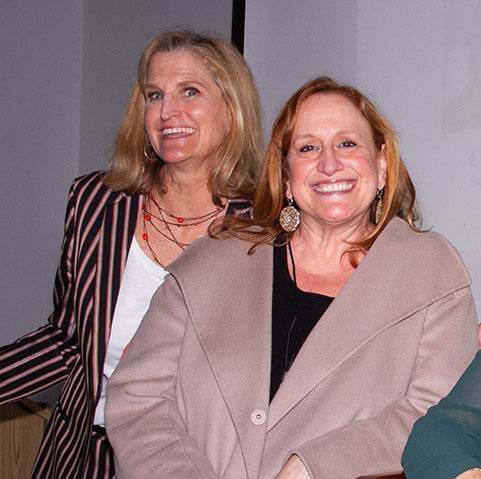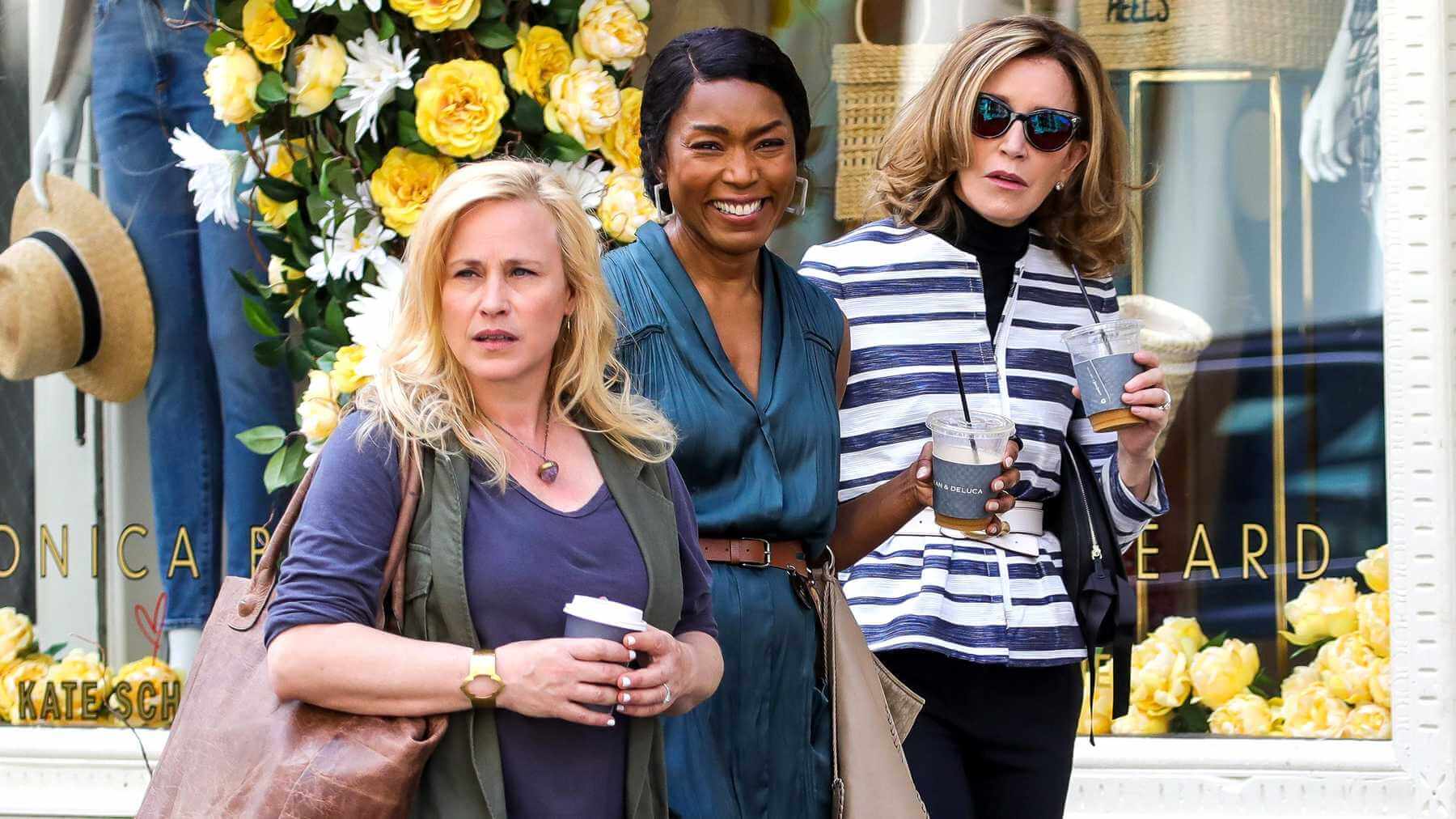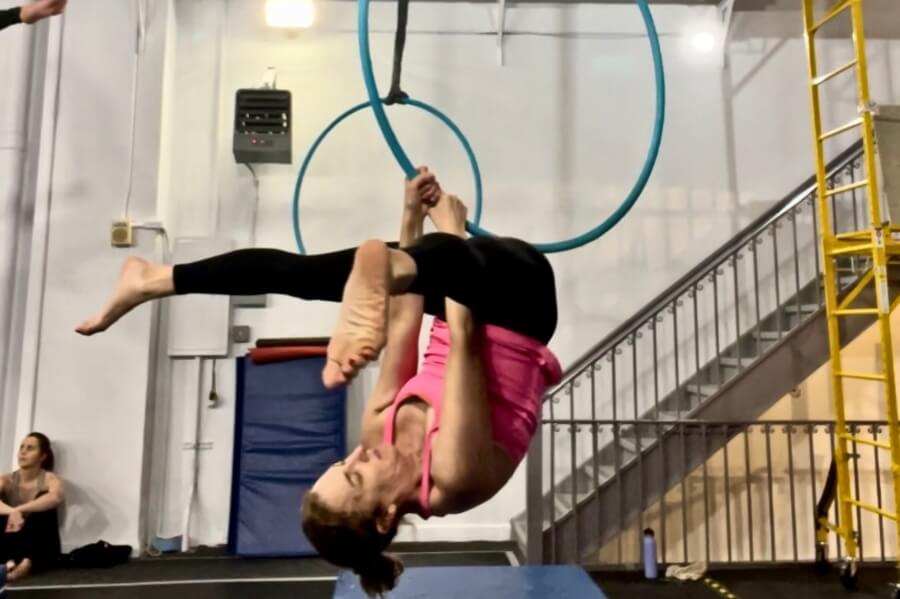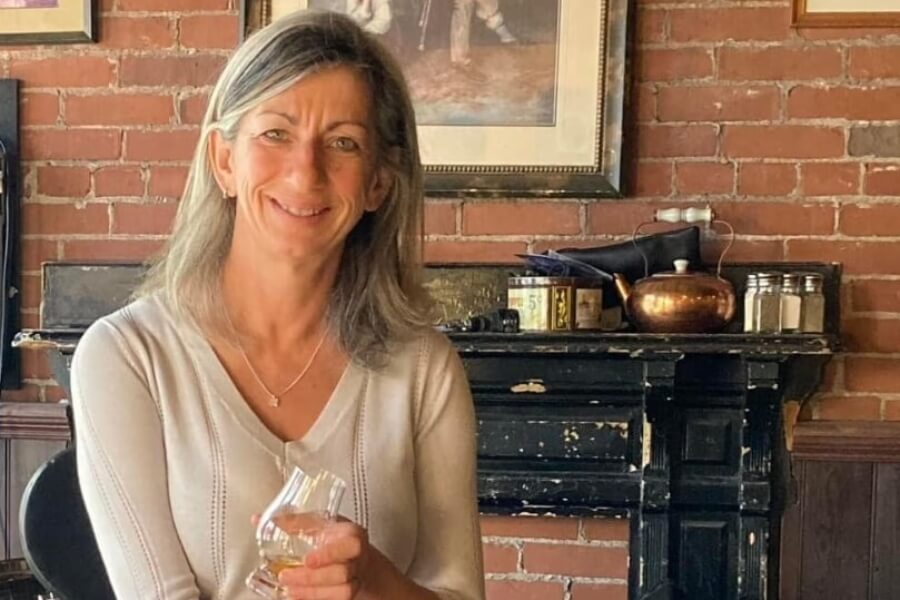Last May, when Cindy Chupack spoke at the NextTribe Out Loud event in LA, the audience loved hearing about her experience as a producer and writer in Hollywood, most notably for Sex and the City and Modern Family. She’s won Emmys and Golden Globes. And, oh yeah, she’s written best-selling books. With a resume like that, it’s easy to imagine that the woman behind it is invincible and that she has a gene for preternatural confidence that has allowed her to take the world by storm.
To encourage you to make this film a shared experience, NextTribe is calling for watch parties across the country on Tuesday night, August 6th. We have a party fun-pack to send you and some incentives, too. Click here for more details.
But the beauty of Cindy Chupack is that she’s as vulnerable and as real as a close friend. When she talked to the audience about directing her first film—which took 10 years to make—she confided that she had been incredibly nervous about directing and because she was afraid she didn’t know enough about camera work, took a workshop for first-time directors. “I think we as women do that to ourselves,” she said. “So often we are focused on the one thing we don’t feel confident about rather than all the things we bring to the table.”
It’s that kind of authenticity and openness that really sets her directorial debut, Otherhood, apart. Even though Cindy does not have an empty nest yet (her daughter is eight), this is a comedy filled with moments that will make you swear she’s been eavesdropping on your conversations. The story is centered on three friends—played by Angela Bassett, Patricia Arquette, and Felicity Huffman—whose sons have grown up together and are now living on their own in Manhattan. The women are at the stage so many of us are at—trying to figure out how to make the most of the years ahead of us now that active duty mothering is over.
The humor is smart and true, and the movie is best watched with gal pals because it is a particular celebration of the transformative power of female friendship. To encourage you to make this a shared experience, NextTribe is calling for watch parties across the country on Tuesday night, August 6th. We have a party fun-pack to send you and some incentives, too. If you register your watch party here and follow the guidelines, you and your friends could win a chance for another party at a later date—this time paid for by NextTribe.

NextTribe Editor Jeannie Ralston with Cindy Chupack after she spoke at the NextTribe Out Loud event in May 2019.
Also, tune in at 10:30 p.m., eastern, on Tuesday, Aug. 6th for a Facebook Live interview with Cindy. You’ll be able to ask her yourself how she came up with some of the best lines and scenes.
To get us started, Jeannie Ralston and Cindy had a quick chat, and Cindy answered some questions about the film, beginning with where the name Otherhood came from.
Read More: The NextTribe Test—Which Movies & TV Programs Show Us as We Really Are?
I read that the film is based on the novel, Whatever Makes You Happy. I’d never heard of it.
It’s a British novel written by William Sutcliffe, and that was the title of this screenplay for a while. Then at a certain point I felt like that might be one of those titles that you confuse with Something’s Got to Give and As Good As It Gets and about a million other movies. I started thinking about what that stage of life is and kind of came up with the term “otherhood” because you’re not quite a mother anymore, so what are you? You’re this other thing; it kind of encapsulated what the movie was about.
So “Otherhood” is your phrase?
Yes! I have a history of creating those sorts of puns from Sex and the City.
I love it! It’s brilliant. The book was written by a man, so I’m interested, what do you think is different about the movie version since you are making it by women for women.
Well for starters, the book is set in Great Britain, and they are “mums” not “moms.” His impulse for the book was that there wasn’t much written about adult sons and their mothers, where a man is close to his mother isn’t a bad thing. He thought it was such an important relationship in his life, so that was his entry point for the book. I feel like, where I intersected, was really empathizing with and wanting to explore what that meant for these three women who were friends and who were in similar stages of life. I wanted to look at the whole story more from the women’s point of view.
The movie is really funny. I mean you have physical comedy and all that, but you don’t go for cheap laughs. There are so many ways you could have gone that just aren’t right, so how did you keep yourself on track with that?
A lot of times women in movies are first the love interest and then mothers of young kids. There are a few stories about mothers of adult kids, and then you get into the Book Club generation of older women, and the women in my film were right in between. I mean that’s what I think the otherhood stage is: you’re not old, you’re still very viable, sexy, and fun, but Hollywood has largely ignored this age and stage.
So I wanted to celebrate what felt real about me and my friends and the women I know who are this age. I think a lot of what you see in movies is coming from a male gaze—a male director or writer or producer’s impression of older women. That’s why I wanted to do this movie—by women for women about women because I could make it more real and honest, based on experience.
The writing is so good. I feel like we need to embroider this line somewhere: “Motherhood, the sinking feeling that as your child is growing up, you’re being broken up on a gradual but daily basis.” That so nails it!
There was a lot that came out of my meetings with actresses who are empty nesting and my talks with my producer Cathy Schulman who is just getting ready to empty nest, and with Patricia Arquette. I remember someone said to me it’s not an empty nest, it’s more like a crater, it’s that big of a hole. I scribbled so many things on my script from different discussions with women, and I kept trying to figure out ways to infuse those ideas into this movie.
It feels like you’ve been listening into my conversations with friends, and I feel like other women are going to really think that.
Thank you. I feel like my best writing has always come from real life. When I was writing Sex and the City, a great source of stories and material was just talking to friends, dissecting what were we worrying about and thinking about. A lot of times your best writing comes from your biggest fears. I remember one writer telling me you should write about a question that you still have, not something that you’ve solved. And I feel like this Otherhood stage is a big question in my life—what are those years after my daughter is off to college going to look like?
Is there one character that you identify with more?
You know there are different aspects of each of them that I really identify with. I’m Jewish, I grew up with a Jewish mother. I think Patricia Arquette, even though her character is a convert, has a lot of Jewish neurosis and guilt. I love the line when she says, “It’s worse than I imagined. I underworried.” There’s this humor and sarcasm built into her character that feels very similar to my sensibility because I tend to joke my way out of uncomfortable situations, or try to lighten difficult things. Kind of laughing through tears, crying through laughter.
But then I also really relate to Carol’s journey because my parents had a similar relationship where my mom takes the backseat, even still, to what my dad wants or needs. He’s just the louder voice in the room. My mother was an artist, like Carol, so there was a lot that I related to in imagining what Carol is going through and what she needed to learn about herself.

Patricia Arquette, Angela Bassett and Felicity Huffman in the Netflix comedy ‘Otherhood.’
Tell me what you drew on from Sex and the City when you were writing this. What did the friendships have in common?
It’s funny your organization is called NextTribe, because I feel like all along the way for women, you have to kind of find your tribe. And I felt that in high school, in college, and after college, and then as a newlywed, as a new mom. Now with my daughter in school, the other parents, even though we’re older than a lot of them, they’re our tribe because we’re just all going through the same thing with kids the same age.
I’ve always loved writing about female friendship because I like writing about commiseration. I think girlfriends are just able to do that better than anyone, so it’s just fun to approach these different stages of life through the lens of friends and see how they support each other and truly help you survive.
We’ve done stories about this: How this is a challenging time of life and we really need friends to get through it. What I like about these friends is how real it is. Like how the others got mad at Helen.
Yes, Helen was probably the most flawed and self-absorbed of the three of them in the beginning of the film, and she has to really do some soul searching there in the end, but yeah they’re still there for each other. I think that you go through those growing pains with friends, especially long friendships, where you’ve been through so much, and I think it’s important to show that a friendship can withstand some conflict. I mean it makes us stronger really.
Read More: Why Meryl Streep Thinks Her Creepy ‘Big Little Lies’ Character is Important
Let’s talk a little more about the making of the film. It took 10 years, and that might not be a long time in Hollywood, but it sounds like a long time to me.
Oh, it seemed like forever! I originally came on to do a polish of the script that existed. The book had already been adapted by Mark Andrus, who wrote the screenplay and won an Oscar for As Good as it Gets. He’s such a fabulous writer. So originally, I was a writer and had no thoughts of directing. But about five years in, I just couldn’t seem to let go of this idea. I couldn’t understand why it hadn’t been made. The producer, Cathy Schulman, and I talked, and she said I should think about directing it. I felt like if I signed on as the director there was a better chance it could get made because I would be one of the missing pieces. But I didn’t realize that I would be the one rolling that rock uphill for five years or longer.
I think it was a battle for the longest time partly because it was about women of a certain age, and the problem with financing in general, frankly, is it’s a lot of men controlling it. That’s why we always talk about the fact that women need to be in these positions of power and gatekeeping in order to be able to greenlight projects because that’s really where the rubber hits the road.
I love the screen credits where you pull back from the car. It felt so joyful and I’m wondering once you got into making it, was it a joyful experience overall?
Yes, I really enjoyed it. I mean I’m only going to say this to NextTribe, but there was a moment as soon as I started directing when I thought, Why have men been pretending that this is so hard? There’s a mystique around directing that it’s something only men in baseball caps can do, but there’s so much of who we are as women that are great assets in directing: Being intuitive, nurturing, creative at problem solving, and empathetic.
So what is it that you want women to feel or think about when they’ve finished watching the film?
I would hope that it will help women commiserate about these feelings that you have of one phase of life ending but a new phase of life beginning. I’d like women to help each other work through how having your children leave the nest is not necessarily an ending but a beginning and how this next stage—Otherhood—could be one of the best times of your life. It’s just a chance to rethink who you want to be and I would love all of us to look at that opportunity through a lens of fun and love instead of through dread and fear.




















0 Comments